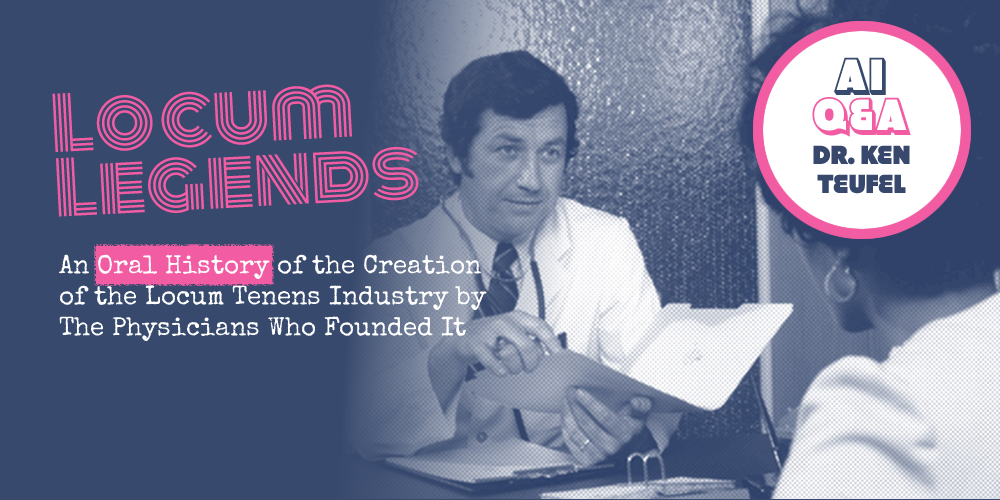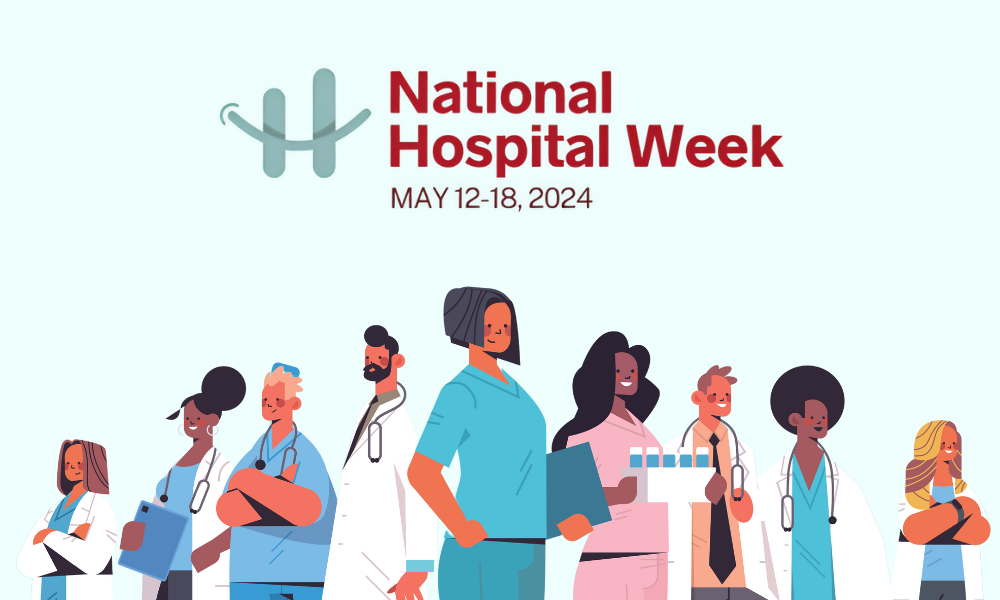Throughout the course of National Locum Tenens Week 2023, Locumpedia has stepped back in time to tell the untold story of the enterprising doctors of the 1970s who revolutionized the delivery of healthcare with locum tenens.
There’s one of the founding fathers of locum tenens we wish we could have interviewed for our series. Dr. Ken Teufel, who passed away in December 2021, founded the agency that eventually became Interim Physicians in 1979. Amazingly, he was the medical director for that firm until his death nearly two years ago.
As a way to give back to the industry to which he devoted his life, Dr. Teufel also published more than 100 columns on the Interim website over 10 years relating to the healthcare industry, medical trends, and staffing. Heck, we even republished some of them here on Locumpedia as our first agency content partnership.
So while we can’t bend Dr. Teufel’s ear any longer, it’s technically possible to “speak” to him in a uniquely modern manner. Thanks to the revolutionary power of artificial intelligence and natural language processing, we did just that.
We’ll get to that in a second! But first, a little background on Dr. Teufel, or “Dr. Ken,” as he was affectionately known by the staff at Interim.
Way back in 1978, Dr. Teufel found himself exhausted and overworked in his solo practice in a small Texas town. Like many of his colleagues in rural practices, he simply wasn’t able to take vacations or many weekends off.
To escape the constant pressure, Dr. Teufel sold his medical practice and traveled the country covering for other doctors (after a stint volunteering for Doctors Without Borders). Before long, he was inundated with requests by other docs desperate to take time off for themselves. In response to this demand, he created a network of temporary doctors and formed a company called Physician’s Relief Network (PRN).
In 1989, an organization named Medical Personnel Pool purchased Teufel’s small firm, and in 1992, MPP changed its name to Interim Healthcare. Finally, a year later, the company was spun out as Interim Physicians, with Dr. Teufel as its medical director. It was a post he would maintain for 28 more years, until his passing.
In this Q&A session with Dr. Teufel, we tapped ChatGPT to interview the man who co-founded locum tenens.
We trained GPT-4 on dozens of Dr. Teufel’s columns published for Interim Physicians over the years and instructed the AI tool to use his voice and tone in each response.
Locumpedia: Talk about some of those early challenges you faced getting started with Physicians Relief Network. What was it that drove you to continue?
Dr. Ken Teufel: One of the hurdles was breaking away from the traditional mold of medical practice. Back then, the concept of locum tenens and physicians covering for one another was not widely accepted. Building a network of locum doctors was no small feat. It was a struggle at first to find skilled healthcare professionals who shared my vision.
Financial stability was another concern. Transitioning from my practice to launching Physicians Relief Network meant taking risks.
Yet, what drove me to persist was the deep-rooted belief that there had to be a better way. The demanding schedules my colleagues faced highlighted the urgent need for a solution. I was motivated by the idea of granting doctors the chance to take time for themselves.
The positive impact I saw on both physicians and patients reinforced my determination. As PRN began to take shape and doctors experienced the relief it offered, their gratitude was a testament to the importance of our work. Seeing the difference we made in their lives fueled my commitment to overcoming any obstacles.
Locumpedia: Those challenges helped shaped the foundation of PRN and then Interim Physicians. You mentioned how the concept of locum tenens was not widely accepted. Why do you think that was?
KT: The concept of locum tenens, I must admit, faced quite a bit of resistance in the beginning.
You see, the medical world has always been deeply rooted in tradition. The idea of having a doctor who isn’t the familiar face patients know was a bit unsettling for some. There was a strong emphasis on continuity of care, and rightfully so. Patients build a rapport with their doctors. The thought of introducing a new face raises concerns about the quality of care and the patient-doctor relationship.
But as time went on, as it often does, perspectives began to shift. For one, the sheer demand for doctors was growing at an unprecedented rate. Physicians worked around the clock. It was taking a toll on their health and their ability to provide top-notch care. That need for relief, that need for a moment to catch a breath, was becoming undeniable.
As we started demonstrating how locum tenens could enhance patient care, that’s when the tide began to turn. Facilities and doctors saw the skills of temporary physicians and started to reconsider. We also worked to ensure that quality remained paramount. Establishing strict credentialing and quality control processes helped build trust in the concept.
Locumpedia: What were some of the ways you sold the idea of locum tenens to recruit providers in those early days of the industry?
KT: Ah, those early days were interesting; they were also rewarding. Selling the idea required a blend of persistence, innovation, and clear communication.
I emphasized the notion of relief. I approached fellow physicians, much like myself, who were feeling the strain of an unrelenting schedule. I pointed out that locum tenens offered them a chance to step back, take a breather, and return to their practice reinvigorated. By focusing on the tangible benefits, I managed to strike a chord with many providers.
I also addressed concerns head-on. I understood the apprehension around continuity of care and quality. As more providers experienced the positive impact of locum tenens firsthand, they became our advocates.
Locumpedia: Locum tenens appears to be a win-win for both providers and facilities. The locum tenens industry has grown significantly over the past year. Right now, it’s a $6.1 billion industry and one of the largest segments of healthcare staffing. What would you envision for the future of locum tenens?
KT: Looking forward, the future of locum tenens holds immense potential. Locum tenens has proven its merits in the evolving healthcare landscape. I foresee a deeper integration of locum tenens within the healthcare community. Its recent growth underscores its attractiveness to healthcare professionals.
As the locum tenens landscape evolves, collaboration between industry stakeholders, regulatory bodies, and educational institutions will be crucial. Ensuring that locum tenens providers are equipped with the right skills and credentials will contribute to maintaining high standards of care.
The increasing demand for quality patient care is likely to enhance the prestige of locum tenens professionals. As their contributions become more recognized, it’s plausible that locum tenens providers will be integrated more seamlessly into healthcare teams, further elevating the value they bring to the industry.
The future of locum tenens will shine bright for many years to come.
Thanks for Reading
This interview is part of our weeklong Locum Legends series published in conjunction with National Locum Tenens Week, which takes place from August 14 to 18, 2023. Each year, during the second full week of August, the locum tenens community celebrates the 50,000+ temporary physicians and advanced practice providers who deliver essential healthcare services across America.








